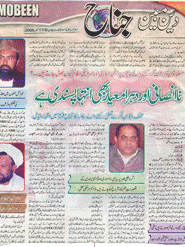Internet must be properly policed by Government
High time for Pakistan to ratify Cybercrime Treaty
In the backdrop of increasing incidents of computer-generated intrusions and card frauds, it’s high time for the Government to establish ICT courts dealing with digital investigations and ratify Cybercrime Treaty, said a statement issued here today.
So far, out of 47 signatories, 22 countries have ratified the treaty, introduced seven years ago. FIA is actively perusing the treaty and made good progress in it but more needs to be done, said Dr. Murtaza Mughal, President of Pakistan Economy Watch.
The number of countries that will have ratified the only international treaty addressing cyber crimes is expected to nearly double this year, a sign that momentum is building in the right direction.
He said that Government had issued an Ordinance dealing with cyber crime back in Dec. 2007 and decided to establish ICT courts to deal with the offenders. He demanded proper training for prosecutors and judges by the concerned wing of FIA.
“Many judges have little or no experience handling cyber crime cases since the technology came along far after they were trained,” Mughal informed.
These courts must be established as soon as possible as the cyber criminals are active with a new zeal.
Government has initiated serious efforts including studying the system and its implications and now it should move forward, he said adding that around 40 countries are expected to ratify treaty by February 2009.
The slow pace comes from the legal and legislative complexities that come with modifying laws in order to comply with the treaty. The EU should work more seriously with countries to ensure compliance.
Pakistan may apply for accession, the first step in implementing the treaty as Philippines, Dominican Republic, Mexico, Costa Rica, South Africa and Brazil are in various stages of conforming to the treaty.
So far, 43 countries have signed the Convention while 21 nations have yet to ratify it. The treaty is aimed at providing for swifter prosecutions of cyber crime as well as better cooperation between law enforcement agencies, as investigations often cross borders.
The development has already contributed to some successes. In Romania, which is seen as a hotbed of cyber crime, the convention has prompted an increasing number of cyber crime investigations and prosecution resulting in a few convictions.
Many of the same obstacles were present when money laundering cases started to proliferate and systems eventually caught the offenders up, said Dr. Murtaza Mughal.





